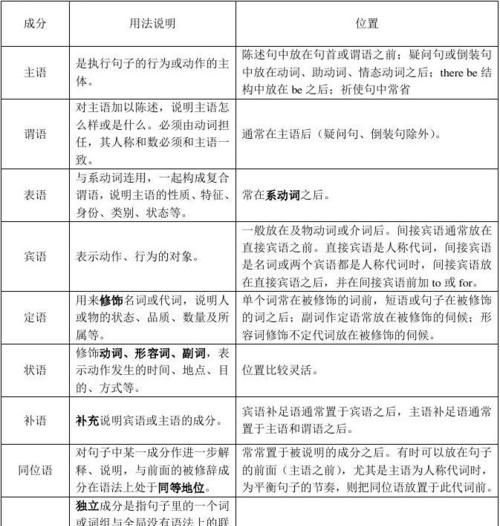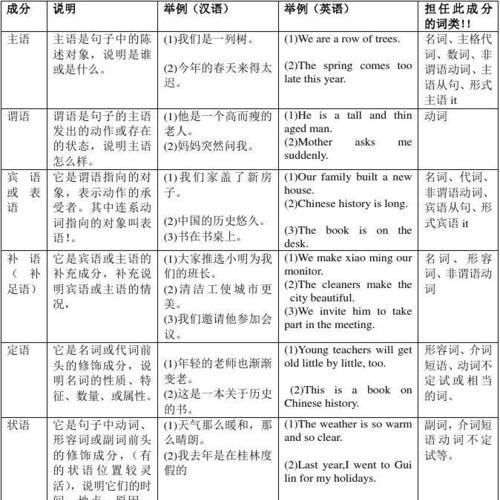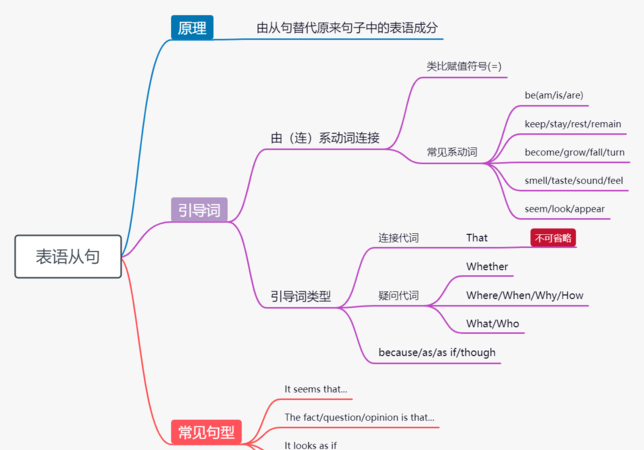本文目录
英语语法分句成分
英语句子成分语法讲解
一、主语(subject): 句子说明的人或事物。

The sun rises in the east. (名词)
He likes dancing. (代词)
Twenty years is a short time in history. (数词)
Seeing is believing. (动名词)
To see is to believe. (不定式)
What he needs is a book. (主语从句)
It is very clear that the elephant is round and tall like a tree.
(It形式主语,主语从句是真正主语)
二、谓语(predicate):说明主语的动作、状态和特征。
We study English.
He is asleep.
三、表语(predicative):系动词之后的成分,表示主语的'性质、状态和特征。
He is a teacher. (名词)
Seventy-four! You don’t look it. (代词)
Five and five is ten. (数词)
He is asleep. (形容词)
His father is in. (副词)
The picture is on the wall. (介词短语)
My watch is gone / missing / lost. (形容词化的分词)
To wear a flower is to say “I’m poor, I can’t buy a ring. ” (不定式)
The question is whether they will come. (表语从句)
常见的系动词有: be, sound(听起来), look(看起来), feel(摸起来),smell(闻起来),
taste(尝、吃起来), remain(保持,仍是), feel(感觉) ….
It sounds a good idea.
The sound sounds strange.
Her voice sounds sweet.
Tom looks thin.
The food smells delicious.
The food tastes good.
The door remains open.
Now I feel tired.
四、宾语:
1)动作的承受者——动宾
I like China. (名词)
He hates you. (代词)
How many do you need? We need two. (数词)
We should help the old and the poor.
I enjoy working with you. (动名词)
I hope to see you again. (不定式)
Did you write down what he said? (宾语从句)
2)介词后的名词、代词和动名词——介宾
Are you afraid of the snake?
Under the snow, there are many rocks.
3) 双宾语——间宾(指人)和直宾(指物)
He gave me a book yesterday.
Give the poor man some money.
五、宾补:对宾语的补充,全称为宾语补足语。
We elected him monitor. (名词)
We all think it a pity that she didn’t come here. (名)
We will make them happy. (形容词)
We found nobody in. (副词)
Please make yourself at home. (介词短语)
Don’t let him do that. (省to不定式)
His father advised him to teach the lazy boy a lesson. (带to不定式)
Don’t keep the lights burning. (现在分词)
I’ll have my bike repaired. (过去分词)
六、主补:对主语的补充。
He was elected monitor.
She was found singing in the next room.
He was advised to teach the lazy boy a lesson.
七、定语:修饰或限制名词或代词的词、词组或句子。
Ai Yanling is a chemistry teacher.(名词)
He is our friend. (代词)
We belong to the third world. (数词)
He was advised to teach the lazy boy a lesson.(形容词)
The man over there is my old friend.(副词)
The woman with a baby in her arms is my sister. (介词)
The boys playing football are in Cla2. (现在分词)
The trees planted last year are growing well now. (过去分词)
I have an idea to do it well. (不定式)
You should do everything that I do. (定语从句)
八、状语:用来修饰v., adj., adv., or 句子。 表示时间、地点、原因、目的、结果、程度、条件、方式和让步。
(以下例句按上述顺序排列) I will go there tomorrow.
The meeting will be held in the meetingroom.
The meat went bad because of the hot weather.
He studies hard to learn English well.
He didn’t study hard so that he failed in the exam.
I like some of you very much.
If you study hard, you will pathe exam.
He goes to school by bike.
Though he is young, he can do it well.
;英语句式成分分析
英语语法句子成分是英语的核心,我在这里整理了相关知识,希望能帮助到大家。
英语语法句子成分分析
句子是由词按照一定的语法结构组成的。组成句子的各个部分叫做句子的成分。句子的成分包括:主语、谓语、表语、宾语(直接和间接宾语)、宾语补足语、定语和状语。
主语
主语是谓语讲述的对象,表示所说的“是什么”或“是谁”。一般由名词、代词、不定代词或相当于名词的单词或短语来充当,也有从句充当的现象。大多数主语都在句首。
如:
讲述“谁” We work in a big factory.
讲述“什么” The classroom is very big.
数词作主语 Three are enough.
从句作主语 What we need is food. 我们最需要的是食物.
▲ 在“There be …”句型中,主语的位置在中间。如:
There are some bottles of milk in the box.
▲ 在个别句型中,主语在整个句子后面,这时前面用it作形式主语。如:
It is very interesting toplay the game called “treat or trick”.
It took two workers aboutthree months to build the house.
谓语
谓语时用来说明主语“做什么”、“是什么”或“怎么样”,谓语必须是动词,谓语和主语在“人称”和“数”两方面必须一致。
如:He is very generous.
She looks very smart and cool
We have finished the job.
He can speak German.
表语
表语说明主语“是什么”或“怎么样”,由名词、形容词、介词、副词、不定式及相当于名词的词或短语来充当,它的位置在系动词后面。
形容词作表语
You look youngerthan before. 名词作表语
Myfather is a teacher. 副词作表语
Everyone is here. 介词短语作表语
They are at the theatre.不定式作表语
My job is to teach them English. 动名词作表语
Her job is training the nurses.从句作表语
宾语
▲宾语是动作、行为的对象,由名词、代词、不定式、或相当于名词的词或短语或从句来充当,它和谓语动词一起说明主语是什么,通常放在谓语动词后面。有时,会有双宾语。
如:
名词作宾语 He never forgives others for their mistakes.
代词做宾语 He often helps me.
不定式作宾语 He likes to sleep in theopen air.
动名词作宾语The Americans enjoyed livingin China.
从句做宾语 I believe that they can finish the work intime.
▲直接宾语和间接宾语
及物动词作谓语时,后面要跟宾语,宾语分直接宾语和间接宾语。直接宾语是及物动词的对象。但有些动词除了直接宾语外,还需要有一个间接宾语,间接宾语表语动作是对谁做的,所以只能用名词或代词来充当。如:
We brought themsome food.
主 谓 间宾 直宾
间接宾语可以放在直接宾语后面,但必须加to 或 for。
宾补
在英语的句子中有些句子里只有宾语并不能表达完整的意思,还必须在宾语后面加上宾语的补足语才能表达完整的意思。我们把“宾语+宾语补足语”合起来称为复合宾语。复合宾语所表达的意思相当于一个巨资的意思。名词、动词、形容词、副词、介词短语、不定式、现在分词、过去分词都可以作宾语补足语.
如:
名词作宾补If you let me go, I’ll make you king.
形容词作宾补 Don’t make your hands dirty.
副词作宾补 We found Li Ming out when we arrived.
介词短语作宾补Make yourself at home.
省略to的不定式作宾补I saw a girl go into the building.
带to的不定式作宾补 The boy ordered the dog to lie down.
现在分词作宾补The boss kept them working all day.
过去分词作宾补Yesterday he got his leg broken.
在英语中,常见的“宾语+宾语补足语”的结构有:
▲“宾语+名词”。常用于改结构的动词有:call, name, make, find, choose, think, leave等。
We call himJack.
They made Li Lei their monitor.
▲“宾语+形容词”。常见的动词有think, believe, leave, drive, make, keep, turn, wish, want等。
如:Do you think his idea wrong?
We must keep our classroom clean.
We can’t leave him alone.
▲“宾语+副词”。副词作宾补常表示宾语的状态,与宾语有逻辑上的主表关系。常见的副词有:down, up, here, there, home, in, out, anywhere等。
如:Let him in/ out.
Mr. Li droveus home.
When got there, we found him out.
▲“宾语+介词短语”。介词短语作宾补常表示其逻辑主语(即宾语)所处的状态,两者有主表的关系。
如:We found everything in good order.
We regard him as our good friend.
He opened the door and found some of his friends in the rain.
▲“宾语+不定式”
充当宾补的不定式有三种:
A 要求带to的不定式
B要求不带to的不定式let, make, see, hear, watch等
C 单词help 后可加 to 或不加 to
▲“宾语+现在分词”
现在分词作宾补,此时在该句型中的宾语即为现在分词逻辑上的主语,有着主谓关系。
I saw them playing on the playground.
I heard Mary singingin the classroom.
▲“宾语+过去分词”。
宾语和宾补之间是被动关系,过去分词表示被动和完成。
I had my bikestolen.
The teacherexplained again and again to make himself understood.
▲ 形式宾语+形容词
We found itimpossible to get there before Saturday.
▲宾语+what从句
Call me what you like. Mr. Li has made the factory what it istoday.
The mountain village is different from what it wasten years ago.
定语
▲定语用来修饰名词或代词。形容词、代词、数词、名词、介词短语、不定式或相当于形容词的词或短语等都可以充当定语。因为它是修饰名词或代词的,而名词和代词可以作主语、表语或宾语,所以定语的位置很灵活,凡是有名词、代词的地方都可以有定语。
如:
形容词作定语 The black bike is mine.
代词作定语 What’s your name?
名词作定语 They madesome paper flowers.
介词短语作定语 The boys inthe room are in Class Three, Grade One.
从句作定语 The tall boy whois standing there is Peter.
▲修饰不定代词 something, anything, nothing, something, anyone, somebody,anybody, nobody 的定语必须后置。
如: We’ll go to have something English.
If you don’t know the answer, ask someone else.
Do you have anything important totell me?
▲介词短语作定语时要后置。
如:Do you know the boy behind thetree?
The students in the room are all my friends.
I think the picture on the left is better than the one on the right.
▲动词的不定式作定语时要后置
What about something to drink?
I have no time to travel to China is in Autumn or in Spring.
▲near by,below, downstairs等个别方位词作定语时要后置。
如:
We are at the topof the hill. Can you see the village below?
The people downstairs are listening to a talk now?
状语
状语用来修饰动词、形容词或副词。它表示行为发生的时间、地点、目的、方式、程度等,一般由副词、介词短语、不定式,从句或相当于副词的词或短语来充当。状语一般放在句末,但有时也可以放在句首、句中。
如:
He did it carefully(程度状语)
They missed me very much.(程度状语)
Without his help, we couldn’t work itout.(条件状语)
In order to catch up with my classmates,I must study hard.(目的状语)
When I was young, I could swim well.(时间状语)
读这些句子巧记句子成分
The snow glows white on the mountain tonight
皑皑白雪覆盖今夜的山
Not a footprint to be seen
埋藏身后我的足迹
A kingdom of isolation
在这孤独白色的国度
And it looks like I'm the queen
我就是那冰雪的女王
The wind is howling like this swirling storm inside
狂风呼号,内心变涌动不能平息
Couldn't keep it in, heaven knows I've tried
不管多努力,再也无法藏匿
Don't let them in, don't let them see
掩藏好自己,不许别人靠近
Be the good girl you always have to be
做一个好女孩,你必须一直都是
Conceal, don't feel, don't let them know
把真心封闭,不让人看清
Well, now they know
如今被看清
Let it go, let it go
不再躲,不再怕
Can't hold it back anymore
秘密已经大白于天下
Let it go, let it go
不管他,不害怕
Turn away and slam the door
告别过去不留一丝牵挂
I don't care what they're going to say
别人的话,何必在乎它
Let the storm rage on
就让狂风怒号
My power flurries through the air into the ground
雪花漫天飘下,这是我的魔法
My soul is spiraling in frozen fractals all around
冰雪旋转纷飞,是我搞错灵魂在升华
I'm never going back, the past is in the past
过去已是过去,是再也回不去
Let it go, let it go
不沉溺,不在意
And I'll rise like the break of dawn
如晨曦一般冉冉升起
Let it go, let it go
算了吧,忘了吧
That perfect girl is gone
别指望我回到过去
Here I stand in the light of day
站在这里,不再藏匿
Let the storm rage on
任那狂风怒号
The cold never bothered me anyway

英语句法成分有哪些
句子成分的定义
构成句子的各个部分叫做句子成分。句子成分有主要成分和次要成分;主要成分有主语和谓语;次要成分有表语、宾语、定语、状语、补足语和同位语。
英语语法句子成分分析:主语
主语是一个句子所叙述的主体,一般位于句首。但在there be结构、疑问句(当主语不疑问词时)和倒装句中,主语位于谓语、助动词或情态动词后面。主语可由名词、代词、数词、不定式、动名词、名词化的形容词和主语从句等表示。例如:
During the 1990s, American country music has become more and more popular.(名词)
We often speak English in class.(代词)
One-third of the students in this claare girls.(数词)
To swim in the river is a great pleasure.(不定式)
Smoking does harm to the health.(动名词)
The rich should help the poor.(名词化的形容词)
When we are going to have an English test has not been decided.(主语从句)
It is necessary to master a foreign language.(it作形式主语,真正的主语为后面的不定式)
英语语法句子成分分析:谓语
谓语说明主语所做的动作或具有的特征和状态。动词在句中作谓语,一般放在主语之后。谓语的构成如下:
1、简单谓语:由一个动词或动词短语构成。如:He practices running every morning.
2、复合谓语:(1)由情态动词或其他助动词加动词原形构成。如:You may keep the book for two weeks. He has caught a bad cold. (2)由系动词加表语构成。如:We are students.
英语语法句子成分分析:表语
表语用以说明主语的身份、特征和状态,它一般位于系动词(如be, become, get, look, grow, turn, seem等)之后。表语一般由名词、代词、形容词、分词、数词、不定式、动名词、介词短语、副词及表语从句表示。例如:
Our teacher of English is an American.(名词)
Is it yours?(代词)
The weather has turned cold.(形容词)
The speech is exciting.(分词)
Three times seven is twenty one?(数词)
His job is to teach English.(不定式)
His hobby(爱好)is playing football.(动名词)
The machine must be out of order.(介词短语)
Time is up. The clais over.(副词)
The truth is that he has never been abroad.(表语从句)
英语语法句子成分分析:宾语
宾语表示动作的对象或承爱者,一般位于及物动词和介词后面。例如:
They went to see an exhibition(展览)yesterday.(名词)
The heavy rain prevented me form coming to school on time.(代词)
How many dictionaries do you have? I have five.(数词)
They helped the old with their housework yesterday.(名词化形容词)
He pretended not to see me.(不定式短语)
I enjoy listening to popular music.(动名词短语)
I think(that)he is fit for his office.(宾语从句)
宾语种类:(1)双宾语(间接宾语+直接宾语),例如:Lend me your dictionary, please.(2)复合宾语(宾语+宾补),例如:They elected him their monitor.
英语语法句子成分分析:宾语补足语
英语中有些及物动词,除有一个直接宾语以外,还要有一个宾语补语,才能使句子的意义完整。带有宾语补足语的一般句型为:某些及物动词(如make等+宾语+宾补)。宾补可由名词、形容词、副词、不定式、分词、介词短语和从句充当。例如:
His father named him Dongming.(名词)
They painted their boat white.(形容词)
Let the fresh air in.(副词)
You mustn't force him to lend his money to you.(不定式短语)
We saw her entering the room.(现在分词)
We found everything in the lab in good order.(介词短语)
We will soon make our city what your city is now.(从句)
英语语法句子成分分析:定语
修饰名词或代词的词、短语或从句称为定语。定语可由以下等成分表示:
Guilin is a beautiful city.(形容词)
China is a developing country; America is a developed country.(分词)
There are thirty women teachers is our school.(名词)
His rapid progrein English made us surprised.(代词)
Our monitor is always the first to enter the classroom.(不定式短语)
The teaching plan for next term has been worked out.(动名词)
He is reading an article about how to learn English.(介词短语)

大学英语语法改写句子题库
目前,随着社会经济的快速发展,英语成为了主要的国际通用语言之一,这必然引起人们对英语学习的兴趣日益增强。我精心收集了关于大学英语语法句子成分,供大家欣赏学习!
关于大学英语语法句子成分1
关系代词
<例句>
I met someone who said he knew you.
我遇到一个人,他说他认识你。
<语法分析>
关系代词 who 代表 someone,又引导从句修饰它,同时又在从句中担任主语。关系代词 who, whom, whose, that和 which可以用来引导定语从句,这类代词都起着三重作用,一是代表前面的名词,二是把从句和它所修饰的词连接起来,三是在从句里也担任一个成分。who 和 whom 都代表人,who 在从句中作主语,whom在从句中作宾语或介词宾语。whose在从句中可以作定语。that可以代表人或物,which 只能代表物在从句中可充当主语、宾语或介词宾语等。
<触类旁通>
(1) The noise that she made woke everybody up.
她弄出的声音把大家都吵醒了。
语法分析:that 代表 noise,又引导从句修饰它,在从句中担任 made 的宾语。
(2) She saw something in the paper which might interest you.
她在报纸上看到的一些消息,或许会使你感兴趣。
语法分析:which 代表 something, 又引导从句修饰它,在从句中担任主语。
(3) The girl with whom I was travlling didn't speak English.
和我一起旅行的那个女孩不会讲英语。
语法分析:whom 代表人,在从句中作宾语或介词宾语。
(4) I saw a film whose name I have forgotten.
我看了一部电影, 名字却忘了。
语法分析:whose 有时指无生命的东西。
(5) Who's the man (that) you were talking to?
刚才和你讲话的人是谁?
语法分析:在从句作宾语时,that常可以省略。
(6) The situation in which she found herself was very difficult.
她的处境非常困难。
语法分析:在紧跟介词时,只能用which,不能用that,而且不能省略。
<巩固练习>
1. The man _____ robbed her has been arrested.
2. The man _____ I saw told me to come back tomorrow.
3. I know a girl _____ mother is an acrobat.
4. He _____ would eat the fruit must climb the tree.
5. The dog _____ was lost has been found.
6. She invited us to dinner, ______ was very kind of her.
7. My dog, ______ temper is very uncertain, often bites judges at dog show.
8. The man from ______ I brought it told me to read me instructions.
<参考答案>
1. who 2. whom 3. whose 4. that 5. which 6. which 7. whose 8. whom
关于大学英语语法句子成分2
不定代词
<例句>
I have no idea about it.
对此我一无所知。
<语法分析>
不定代词no在句子中作定语,此外,every也可作定语。除了这两个词外,其他的不定代词既可用作名词也可用作形容词,大多数在句子中可充当主语、宾语、表语、同位语和定语等。
<触类旁通>
(1) Someone (somebody) has turned off the light.
有人把灯关了。
语法分析:合成不定代词 someone 和 somebody 意思相同,都表示“某人”,但只用于肯定句,在否定句及疑问句中通常用 anybody 或 anyone。
(2) Everybody (everyone) laughed, me included.
大家都笑了,我也笑了。
语法分析:everybody 和 everyone 意思相同,表示“人人”、“大家”。
(3) Did any of your photos come out well?
你的照片洗出来都不错吗?
语法分析:any 可代表可数名词或不可数名词名词,在句子中作主语或宾语等,可用于否定句及疑问句,肯定句用 some。
(4) She is in no mood (not in a mood) for jokes.
她没有心情说笑话。
语法分析:no 可构成否定句,等于 not a。
(5) I never saw so many swans on the lake .
我从未见过湖面上有这么多天鹅。
语法分析:many 修饰可数名词,可用在疑问句,否定句及肯定句中,还可与too, so 等词连用,much, few 及 little 也可表示数量,与many 一样,都可用作定语。
(6) None of us would have said such a thing.
我们谁也不会说出这种话来。
语法分析:none 和 no 一样,都是否定词,none可用作主语、宾语或介词宾语及同位语。
<巩固练习>
1. I will tell you _____ of my own experience.
2. If you want ______ , you can call me.
3. I'll take ______ that you don't want.
4. As ______ as ten people were found living in a single room.
5. You've given me too ______ food.
6. ______ went his way.
7. ______ of my parents live in Japan.
8. One of the boys is named Tom, the _____ named Bill.
9. Show me some ______.
10. I don't like this room. Let's ask for _____.
<参考答案>
1. something 2. anything 3. any 4. many 5. much 6. Each 7. Both 8. other 9. others 10. another
关于大学英语语法句子成分3
some的用法
<例句>
She's living at some place in Canada.
她住在加拿大的某个地方。
<语法分析>
不定代词some的意思是表示“一些”,可以用来指人或其他可数的东西,也可以用来表示不可数名词的东西,它在肯定句中用作主语、宾语、定语等。在这个句子中,some和单数可数名词连用,其意义是表示“某个”,这与certain的意义相同。
<触类旁通>
(1) Some of them can speak English.
他们中的有些人会讲英语。
语法分析:简单用法。
(2) Can I take some of these apples?
这些苹果我拿些可以吗?
语法分析:一般在疑问句里要用any,但有时候却要用到本应用在肯定句中的some这个词,这种用法所表达的含义是希望得到肯定的答复。这个例句的所隐含的意思是我很想拿一些苹果,希望对方给予肯定性的回答。
(3) She enjoys some music.
她喜欢某些音乐。
语法分析:some修饰不可数名词。
(4) Aren't there some eggs on the table?
桌子上不是有些鸡蛋吗?
语法分析:some用于反问句或请求句中。
<巩固练习>
1. Did ______ of you catch the train.
2. ______ children learn languages easily.
3. ______ work is very difficult.
4. Would you like ______ tea?
5. Ask ______ secretary to come here.
<参考答案>
1. some 2. Some 3. Some 4. some 5. some

以上就是关于英语语法的成分,英语语法分句成分的全部内容,以及英语语法的成分 的相关内容,希望能够帮到您。

